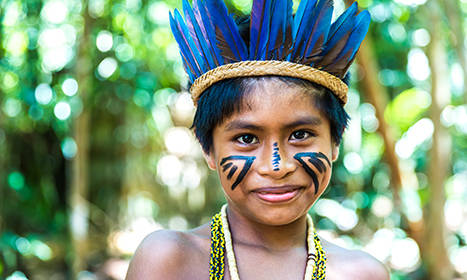
© Shutterstock.com
10th Anniversary of the UN Declaration on the Rights of Indigenous Peoples
This year, we celebrate the 10th anniversary of the landmark UN Declaration on the Rights of Indigenous People. This is an opportunity to honour the rights of indigenous peoples and their unique contribution to achieving mutual understanding, peace and sustainable development. Indigenous peoples are custodians and practitioners of unique cultures and relationships with the natural environment. They embody a wide range of linguistic and cultural diversity at the heart of our shared humanity. Protecting their rights and dignity is protecting everyone’s rights and respecting humanity’s soul, past and future.
The protection and well-being of indigenous peoples has never been so important. Despite their cultural diversity and homelands across 90 countries, they share common challenges related to the protection of their rights as distinct peoples. 370 million indigenous peoples make up less than 5 per cent of the world's population but account for 15 per cent of the poorest.
In this spirit, UNESCO’s latest Global Education Monitoring Report provides concrete guidance and policy advice for the advancement of indigenous peoples’ rights’.
UNESCO launched the Local and Indigenous Knowledge Systems (LINKS) programme in 2002 to support governments in creating synergies between scientific and indigenous peoples’ knowledge. This has been furthered through a policy brief on “Indigenous and Local Knowledge(s) and Science(s) for Sustainable Development” issued by The Scientific Advisory Board (SAB) of the United Nations Secretary-General. All this inspires UNESCO’s ongoing work to develop a Policy on Engaging with Indigenous Peoples to ensure a stronger implementation of the UN Declaration.
This will not only be beneficial to indigenous peoples but for all of humanity and our planet.
Let us join our efforts and share this message - #weareindigenous !
Message from Irina Bokova, Director-General of UNESCO
on the occasion of the International Day of the World's Indigenous Peoples 2017
English ǀ Français ǀ Español ǀ Русский ǀ العربية ǀ 中文
United Nations Declaration on the Rights of Indigenous Peoples
The Declaration is the most comprehensive international instrument on the rights of indigenous peoples. It embodies global consensus on the rights of indigenous peoples and establishes a universal framework of minimum standards for their survival, dignity and well-being. It elaborates on existing human rights standards and fundamental freedoms, as they apply to the specific situation of indigenous peoples.
About the Day
The International Day of the World's Indigenous Peoples, celebrated each year on 9 August, marks the day of the first meeting, in 1982, of the UN Working Group on Indigenous Populations of the Subcommission on the Promotion and Protection of Human Rights.
Events
- Special event at UN Headquarters - 09 August 2017
- Knowledge of Fulani pastoralists and scientific knowledge on weather and climate : Convergences to strengthen local resilience in West Africa
14-16 August 2017, Burkina Faso - Mobilizing local and indigenous knowledge for climate change observations and solutions: A perspective from the Caribbean region
27-29 September 2017, Guyana
Indigenous Peoples & the United Nations...
- United Nations Declaration on the Rights of Indigenous Peoples
- ILO Convention Nr. 169 on the Rights of Indigenous and Tribal Peoples
- United Nations Permanent Forum on Indigenous Issues
- Expert Mechanism on the Rights of Indigenous Peoples
- Special Rapporteur on the rights of indigenous peoples
- UN Voluntary Fund for Indigenous Peoples
Highlights
Implementing the UN Declaration on the Rights of Indigenous Peoples
UNESCO, together with indigenous peoples, implements initiatives aimed at strengthening the rights of indigenous peoples aligned with the 2030 Agenda for Sustainable Development.
Conservation and protection of the environment
UNESCO supports indigenous-led strategies for sustainable land use, conservation and protection, and promotes indigenous and local knowledge systems to address global environmental change and its emerging challenges.
Education and knowledge transmission
Education for All means quality education for, first and foremost, those who are excluded from the formal education system. UNESCO facilitates the development of culturally and linguistically appropriate materials and monitors international instruments, while working to strengthen intergenerational transmission of local and indigenous knowledge.
Cultural and linguistic diversity
UNESCO has developed various standards that offer spaces to promote indigenous peoples’ cultural rights and foster direct engagement with them. The Organization is taking urgent action to promote multilingualism and linguistic diversity, and to safeguard endangered languages.
Media and Knowledge Societies
The current revolution in information technology and networks, makes communication systems of special importance to indigenous peoples – for sharing, informing and educating, for generating income and reinforcing self-reliance.
Social Inclusion
UNESCO is particularly concerned by the situation of indigenous peoples in terms of human rights, discrimination, gender equality, poverty eradication, democracy, and social transformations.
Recently published
More videos
Te Puna Reo o Nga Kakano (New Zealand)
Using traditional Māori knowledge and practices to address contemporary social and environmental issues in New Zealand.
Our language and way of life: how young children learn at the Mae Tien ECD Centre (Thailand)
This video reflects the pedagogical approach used in ECD programmes which is underpinned by a concern for protecting and preserving cultural heritage in ethnic minority communities and engaging community members in formal learning.
Innovations for improving the equity and quality of early childhood care and education in Asia and the Pacific (playlist - 9 videos)














